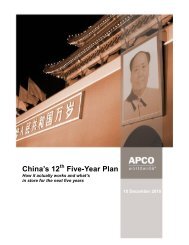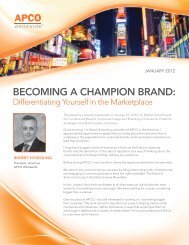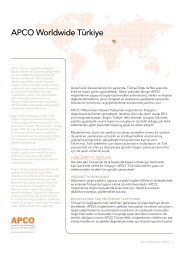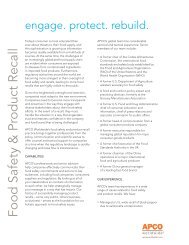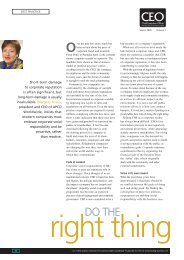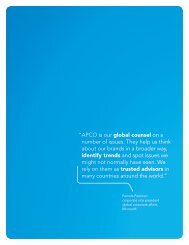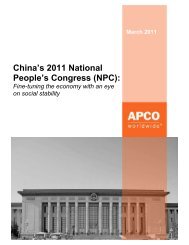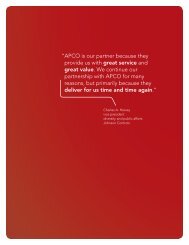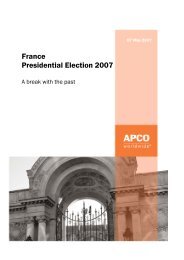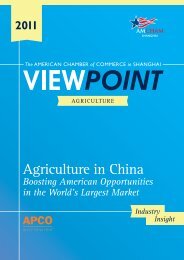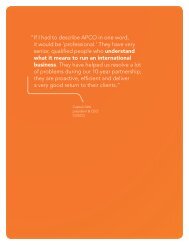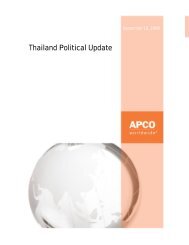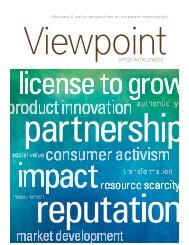Create successful ePaper yourself
Turn your PDF publications into a flip-book with our unique Google optimized e-Paper software.
INTERVIEW<br />
WE’RE ALL<br />
ACTIVISTS NOW<br />
<strong>Garry</strong> Walsh tells<br />
Andrew Alexander that<br />
US-style, campaigning<br />
public affairs is taking<br />
hold in Brussels<br />
<strong>Garry</strong> Walsh was once included<br />
in a national newspaper list<br />
of ‘vampire executives’, as a<br />
lobbyist with clients on the west<br />
coast of the US and little respect<br />
for time zones.<br />
The newly appointed managing director<br />
of <strong>APCO</strong>’s Brussels office still travels<br />
and takes conference calls at “horrendous<br />
times”, but since moving from the<br />
UK in 2004 has specialised in central and<br />
eastern European member states.<br />
“I got over to Brussels just about the<br />
point of enlargement, so we went from 15<br />
to 25, and now to 27, and what happens<br />
in Bucharest and Berlin and Paris and<br />
Tallinn matters in a European context,<br />
and so I’ve spent a lot of my time, about<br />
40 per cent over the last few years, flying<br />
around the different national capitals running<br />
public affairs activities from a very<br />
Euro-centralised perspective. But that’s<br />
been interesting as well because you get<br />
to see a bit about how the microcosm of<br />
Brussels is judged in the member states.<br />
“Obviously, in the UK you’ve got occasionally<br />
polarised positions, and where<br />
you don’t quite have that in other member<br />
state capitals, it is interesting to see<br />
how Brussels is viewed. Much as if you<br />
were a DC lobbyist, it’s good to look beyond<br />
the beltway occasionally, it’s great<br />
to get out of Brussels and actually experience<br />
it.”<br />
Walsh enjoys being based in Brussels<br />
because he has never been “100 per cent<br />
focused on any one market”, and Brussels<br />
allows him to have an internationalist<br />
rather than a Eurocentric approach.<br />
Having once wanted to be a lawyer, and<br />
after a stretch as assistant to several Conservative<br />
MPs in Westminster in the mid-<br />
1990s, Walsh worked for PPS and then<br />
Text 100 spin-off AUGUST.ONE Communications,<br />
with Microsoft his most significant<br />
client.<br />
14 | PublicAffairsNews | March 2007<br />
This led to working on European spam<br />
legislation, and he seems to enjoy the<br />
technology angle – which “sort of grew<br />
on me” – because it is also no respecter<br />
of borders.<br />
He talks with relish of working on the<br />
Computer Implemented Inventions Directive,<br />
covering software patents. “It<br />
became passionate and it had everything<br />
from protests to public demonstrations.<br />
“That was fun, that was ‘campaigny’,<br />
and I think Europe has become the focus
for the new wave of activism that has the<br />
ability to use the internet and things like<br />
that to coordinate and organise on a pan-<br />
European scale, and actually can be quite<br />
impacting, quite campaigny.”<br />
Walsh sees more similarities between<br />
Brussels and Washington DC than he did<br />
while a lobbyist in London, with a thrust<br />
towards campaigning.<br />
“I think I went over to Brussels at a<br />
point where Europe was getting more interesting<br />
for enterprises and for businesses:<br />
there was a move away from the issues-<br />
management of old, that it was great to<br />
be right on paper.<br />
“I think companies started to look at<br />
Brussels and think, actually I need to<br />
win this one and I don’t want to have the<br />
smug sense of self-satisfaction that my arguments<br />
were right but I still lost.”<br />
He notices the American influence on<br />
Brussels, and thinks it is a “great place to<br />
hub network business”.<br />
“If you look at <strong>APCO</strong> in Brussels;<br />
we have a chunk of our clients that are<br />
deeply immersed and deeply interested<br />
in what is going on in the EU institutions<br />
and the broader instruments that control<br />
the EU.<br />
“We also have a lot of clients who are<br />
interested in pan-European media and<br />
interested in influencing stakeholders<br />
and building relationships across Europe.<br />
And if I look at my own office, I’ve got 15,<br />
16 different nationalities under one roof,<br />
it’s very hard to go somewhere else in the<br />
world and find that.”<br />
<strong>APCO</strong> has a team of about 50 people in<br />
Brussels, but Walsh says he can see it rising<br />
to 70 in two or three years with “genuine<br />
growth potential” in the market, and<br />
plenty of business for a firm known for its<br />
mergers and acquisitions work.<br />
Walsh’s wife is American, and would<br />
like one day to move back to the US. But<br />
he says the decision to stay in Brussels<br />
was a “no-brainer”: He is enjoying himself<br />
too much to go anywhere else.<br />
It is having more influence over a<br />
“great team of people” that he says he<br />
relishes most about the new job. “Helping<br />
those guys and providing them with<br />
careers and training opportunities and<br />
career paths and opportunities to grow<br />
as individuals, I think it’s just an amazing<br />
thing to sit and do, one of my key<br />
motivators.<br />
“I’ve worked in big PR firms so I’ve<br />
seen the people management at perhaps<br />
a less rosy angle.”<br />
A fairly evangelical brand ambassador<br />
for <strong>APCO</strong>, Walsh insists the company is<br />
“absolutely glocal”. “I have such great relationships<br />
with my colleagues in other<br />
offices around the world, we have employee<br />
exchange programmes, we’ve<br />
got three people from Brussels this year<br />
– one to New York, one to Tel Aviv and<br />
one to Beijing, so we make a hell of an<br />
investment in terms of being “glocal”.<br />
“I think because of our independence,<br />
because we don’t have to go to a board in<br />
New York periodically to explain what the<br />
figures are doing, I think we can make<br />
decisions such as opening an office in<br />
new territories and I think we’ll continue<br />
to have that ability to move to where our<br />
market needs are. It really doesn’t feel<br />
like a very big organisation.”<br />
He sees public affairs in Brussels continuing<br />
to change after the latest round<br />
of accession, with the intake of a “generation<br />
of rising people” – some former<br />
prime ministers or foreign ministers<br />
– from new member states strengthening<br />
the European Parliament’s hand.<br />
Talking about the merits of brand, he<br />
prizes some of the “grey hair” talent the<br />
company can attract, including former<br />
Czech Republic Commissioner Pavel Telicka<br />
and former president of the EU Parliament,<br />
Pat Cox.<br />
And he takes a bullish approach to<br />
the company and the industry’s future.<br />
“Having people who ‘get’ politics is quite<br />
important right now, but the client of tomorrow<br />
is going to want people who understand<br />
what business does.”<br />
An understanding of what directors<br />
and chief executives want, and “bedding<br />
in” with the company is, he says, “in the<br />
DNA of everything we do”.<br />
“I’m very lucky with some of my clients,<br />
I work very closely with CEOs and they’re<br />
not that interested in politics, they’re<br />
interested in politics as it’s impacting<br />
their business, and getting that right is<br />
fundamental, having a business eye and<br />
not just doing things the way you’ve done<br />
them for years.”<br />
Walsh sat on the APPC for several years,<br />
a body he says he hugely respects, and is<br />
interested in questions about industry<br />
regulation. From four years as a councillor<br />
on Westminster Council he says he<br />
knows lobbyists include everyone from<br />
global public affairs companies to residents’<br />
associations complaining about<br />
mobile phone masts.<br />
Asked if some – NGOs like Greenpeace,<br />
for instance – get preferential treatment,<br />
he says “perhaps”.<br />
“I think it comes down to transparency.<br />
The more open the lobbying industry is<br />
and the more what we do is understood<br />
by wider stakeholder groups, the less finger-pointing<br />
and suspicion you get, and I<br />
think that’s quite crucial.”<br />
He is implicitly sceptical about the<br />
value of the Kallas proposals, and thinks<br />
the industry in Europe will learn to selfregulate,<br />
as it did in the UK. “The more<br />
open and transparent we are, the more<br />
conscious we are of the need to self-regulate<br />
and weed out bad practice, the less<br />
need there is for government to bring in<br />
legislation.”<br />
He says the “cool thing” about the<br />
public affairs industry is the range of<br />
backgrounds on offer: “Some lobbyists<br />
represent commercial interests and some<br />
NGOs and the public and consumer organisations.<br />
I think by us all contributing<br />
you get better law.”<br />
Some lobbyists<br />
represent<br />
commercial interests<br />
and some NGOs<br />
and the public<br />
and consumer<br />
organisations.<br />
I think by us all<br />
contributing, you<br />
get better law<br />
March 2007 | PublicAffairsNews | 15



